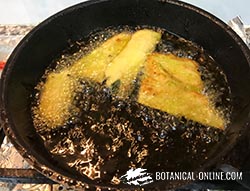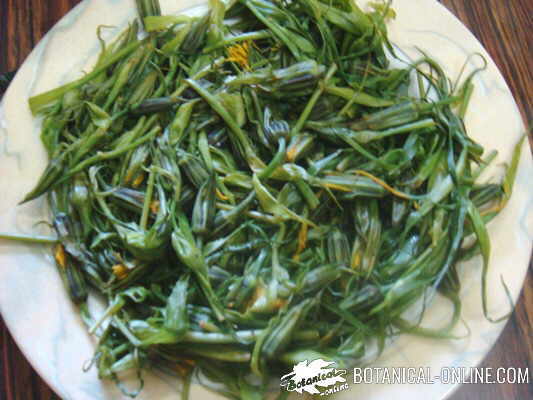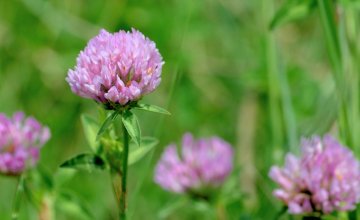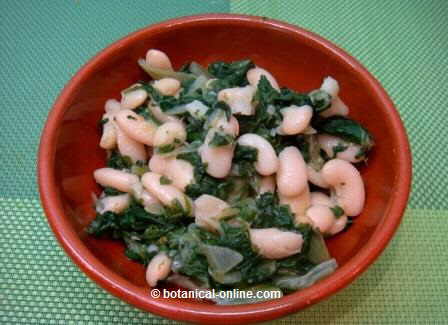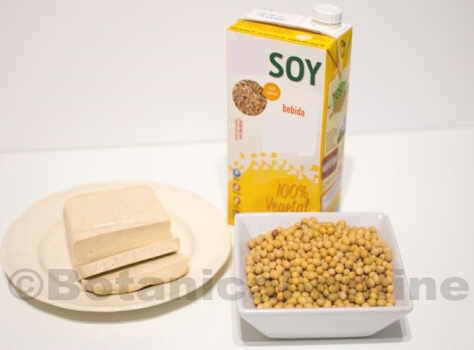Contents
- 1 Characteristics of acrylamide
- 1.1 What is acrylamide?
- 1.2 Acrylamide structure
- 1.3 Foods with acrylamide
- 1.4 Health risks of acrylamide
- 1.5 What other health problems can acrylamide have?
- 1.6 Toxicity of acrylamide
- 1.7 Acrylamide and cancer
- 1.8 Foods containing acrylamide
- 1.9 What are the foods with the most acrylamide?
- 1.10 Table of contents in acrylamide of food
- 1.11 Dietary recommendations
Characteristics of acrylamide
What is acrylamide?

Acrylamide is a substance that forms when foods rich in carbohydrates are fried, toasted or roasted.
The chemical reaction that produces the characteristic golden color of food is called the Maillard reaction. It involves mainly carbohydrates, amino acids (in particular asparagine) and high temperatures (higher than 120ºC).
Acrylamide structure
Chemically, acrylamide is a molecule called 2-propenamide (CH2CHCONH2) which is soluble in water.
Foods with acrylamide
It is easy to find this substance in chips , cookies, bread and breakfast cereals.
- Acrylamide can not be formed at low temperatures, therefore it is not present in boiled, steamed or papillote foods.
It is one of the carcinogenic components of tobacco smoke. In fact, smoking is one of the main sources of exposure to acrylamide, as well as to other toxic substances such as nitrosamines, polycyclic aromatic hydrocarbons, etc.
Health risks of acrylamide
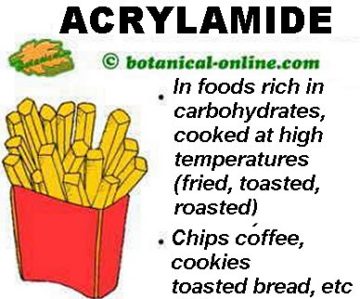
In both animals and humans, acrylamide is converted to glycylamide, a substance that damages the DNA of cells and can induce tumors. Studies in animals have shown that prolonged administration of acrylamide can cause cancer and decrease male fertility.
What other health problems can acrylamide have?
Most studies have been done on animals, and there is not enough evidence that acrylamide causes cancer in people.
Other information based on workers exposed to acrylamide suggests that it causes lesions in the nervous system, usually peripheral neuropathy.
Toxicity of acrylamide
Estimates of the total intake of acrylamide through the diet are about 100 micrograms per day, which is approximately 1.7 micrograms per kg. of body weight / day, more than a thousand times less than the doses that caused effects on the nervous system or reproductive in scientific studies.
Acrylamide and cancer
Acrylamide has been classified as “probable carcinogen to humans” by IARC (International Agency for Research on Cancer).
Likewise, through the official regulatory bodies, manufacturers of products susceptible to containing acrylamide are informed about good technological practices to reduce their content. This is what is known as ALARA (As Low As Reasonably Achievable. Food industry operators are obliged to take the necessary measures to minimize the presence of contaminants, taking into account the needs of your product (which retains good taste and characteristics).
Foods containing acrylamide
It is found in foods rich in carbohydrates, which are mainly cereals and potatoes, which have been cooked at very high temperatures, such as fried, toasted or roasted.
- The typical golden color of the food may indicate the presence of this substance, because it means that the Maillard reaction, acrylamide precursor, has been produced.
What are the foods with the most acrylamide?
The main sources of acrylamide are:
- Smoke of the tobacco
- Potato chips, bag or homemade.
- Barbecue potatoes or grilled ones
- Sweet potato or fried or grilled sweet potato
- Battered and fried
- Biscuits or bread toasts
- Bread, crackers and other bakery products
- Breakfast cereals
- Coffee substitutes made with toasted cereals
- Roasted nuts and fried nuts
- Coffee
Table of contents in acrylamide of food
| Food | Amount of acrylamide (micrograms per kilo) |
| Substitutes of coffee based on cereals | 2,000 |
| Potatoes chips | 600 – 1,000 |
| Soluble coffee | 900 |
| Bread toast, crusty bread, cookies and waffles | 500 |
| Toasted coffee | 450 |
| Breakfast cereals (except for porridge) | 400 |
| Tin loaf | 80 |
Source: “Recommendation of the Commission of November 8, 2013 regarding the investigation of acrylamide levels in food”. Official Journal of the European Union (2013/647 / EU).
Dietary recommendations
- It is recommended that fresh fruits and vegetables abound in the diet, due to their antioxidant contribution and their anti-cancer role.
- The consumption of raw foods (salads, fruit salads, fruit, nuts, etc.) and cooking at low temperatures should be encouraged: boiled, steamed, papillote, etc.
- Do not eat fried foods, grilled or roasted at high temperature too often. When these foods are consumed, accompany them with fruits and vegetables rich in vitamin C and beta-carotene.
- Extra virgin olive oil contains more vitamin E (antioxidants) than refined oils.
- A healthy diet is the best guarantee of health.
![]() More information on toxic products in food
More information on toxic products in food

